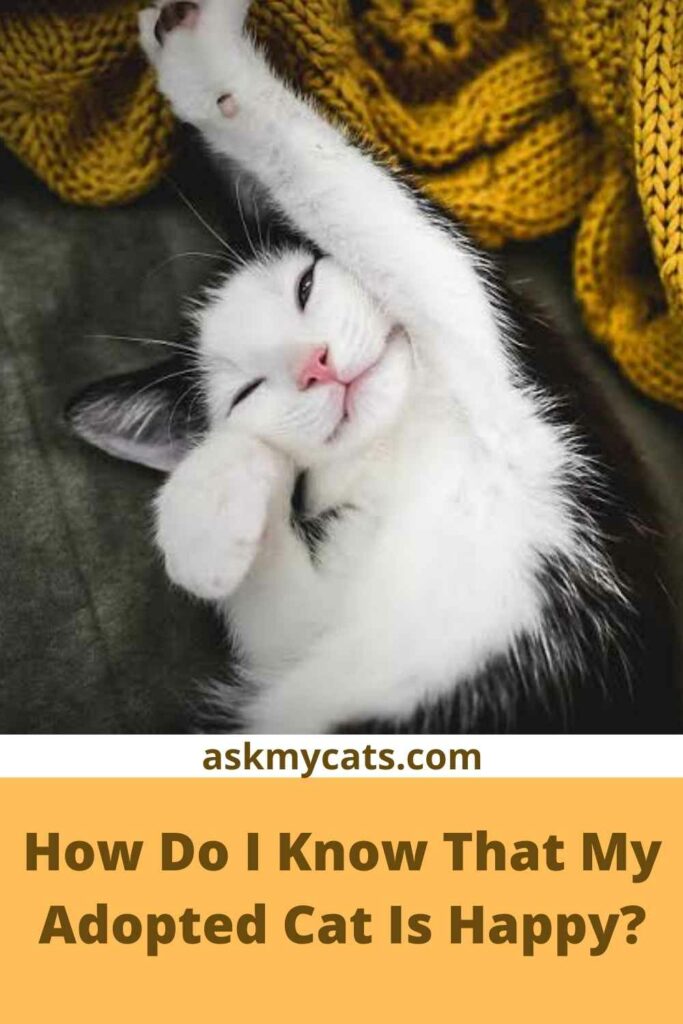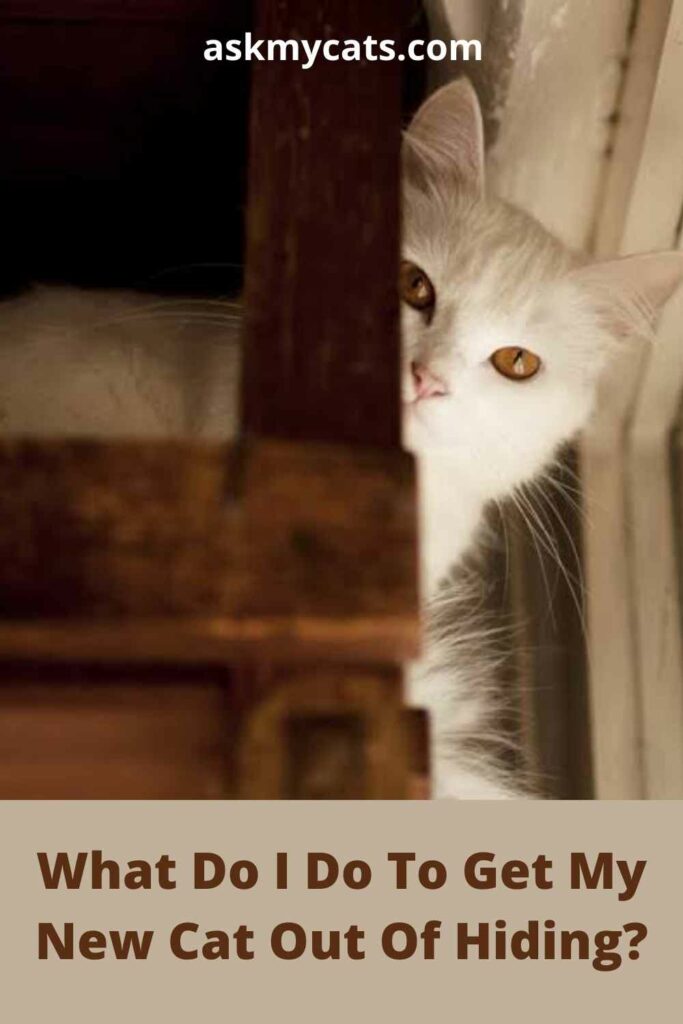Adopting a cat is a thrilling experience and adopters frequently cannot wait to make their furry friend a part of the family.
Cats are extremely sensitive creatures and a new place may make them feel uneasy. After bringing home a newly adopted cat, the first few weeks may be difficult for you as well as your new member of the house.
Kittens meow in order to communicate with their mother. They also meow whenever they want to express discomfort, hunger, cold, or agitation. Give your pet some time to become accustomed to a new area with different scents, noises, people, and other pals. It is extremely necessary to allow your pet a lot of time to adapt.
It is not uncommon to see some quirky or concerning behavior from your new feline friend. Spend some time and get to know each other.
In this, article we will discuss the reasons why your newly adopted cat keeps meowing.


Give Your Cat the Perfect Day
Get the Free Ebook!
Why Does My Newly Adopted Kitten Keep Meowing?

The cat’s meow is her way of communicating with others. They can be very vocal in their demand for attention. Newly adopted cats are still in the process of adjusting and may meow a lot.
Kittens meow for various reasons which we will discuss below:
1. To Greet People
As a way of communication, your cat can be expected to meow in greeting. When you arrive back home or when she greets you in the house and you talk to her, your cat could meow in greeting.
2. To Demand Attention
Cats love social contact with people and some are extremely loud in demanding care. The cat may like to be rubbed, played with, or just conversed with. Cats that are left alone for a lengthy period of time each day may be more likely to meow for attention.
3. To Request Food
Most cats like to eat and they may be rather demanding during meals. Some cats learn to meow anytime anybody enters the kitchen, just in case they might be fed. Others meow for you to get up and bring them food.
4. To Request Admission Or Exit
Meowing is the cat’s primary method of communication. She’ll probably learn to meow at the door if she wants to go outdoors. Similarly, if she’s outside and wants in, she’ll meow for you to allow her in.
Also, check out Reasons Why Cat Keeps Meowing At Door!
Is It Normal For A New Kitten To Meow A Lot?
It is quite normal for a newly adopted cat to meow frequently while it adjusts itself to new surroundings.
When they are hungry, cold, or afraid, kittens meow to their moms. However, when cats grow older, they utilize various vocalizations to communicate with one another, such as yowling, hissing and growling. Meowing is restricted only to their communications with people.
However, the intensity of meowing varies between breeds and individual cats. It is normal for a newly adopted cat to meow as it still gets accustomed to its surroundings.
You might also like to check out why won’t my cat shut up
How Do I Get My New Cat To Stop Meowing?
You must establish the reason for your cat meowing before you try to reduce their excessive vocalization. Look at the conditions surrounding her meowing and observe what appears to stop her.
Once you have recognized when she is prone to meow excessively, try these tips to help her control her vocalizations:
- If your cat meows to say hello, you’ve got a special talkative cat that tells you how pleased she’s to see you. It is unlikely that you’ll be able to do anything to improve the situation.
- If your cat meows for attention, let her know that you will pay her attention only when she is still. Resist the desire to pay her any kind of attention. Be patient instead and wait for a little time of stillness before giving her the attention she wants. If she begins meowing again, move away and only come back to her when she is silent.
- If your cat cries at you to feed her, stop feeding her. Feed her at certain times so that she knows that other times it is useless to ask for food. She will catch on if you’re consistent.
- If your cat is meowing at you to allow her in/out, try installing a cat door. If you have a cat who is familiar with going away and wish to hold her in, she will probably go meow at the doors and windows for a while. There is no easy method to get over it but it will finally adapt to its indoor life and cease meowing excessively.
How Long Does It Take For An Adopted Cat To Adjust?
We are frequently asked how long it takes for an adopted cat to acclimate to a new home and family. It is determined by your cat’s personality.
That being said, you should notice your kitten becoming more at ease around you within a week or two.
Give your little furry friend enough space to adjust. You will see her warming up to you and her surroundings in a few weeks.
You will surely like to read about how long does it take a cat to adjust to new home
How Do I Know That My Adopted Cat Is Happy?

Cats express their satisfaction in a variety of ways as every cat is unique. They use various portions of their body to show us how they’re feeling.
As a cat parent, you may have wondered if your cat is content. Our feline companions, like us, convey how they feel through body language and vocalizations.
1. Vocal hints
Cats may be rather loud, especially when they are pleased. Vocal cats may engage in lengthy discussions with you. The tone of their meow indicates how they are feeling.
2. A Healthy Appearance
Cats will keep themselves well-groomed if they feel good. A happy will even lick its owner, demonstrating trust and a healthy connection.
3. A Relaxed Stance
If your kitten sleeps with their paws tucked under, they are comfortable and at ease. A cat in a happy mood will shrink to seem tiny and unthreatening but an angry cat would extend its legs and erect the fur along the spine.
A happy cat’s tail will stand straight up with just the tip crooked to greet people and other pets the cat deems friendly.
4. Playful Behavior
Play is an excellent indicator of contentment and your kitten will engage in it with other creatures and humans they enjoy or trust. Exuberant sprints, as well as quiet paw stroking of the features all, suggest a happy cat.
5. Healthy Appetite
A healthy appetite is a great indicator of a contented cat. Your cat may request food by rubbing against your legs and meowing, directing you to their bowl.
All cat parents wish for a contented cat snuggled up on their lap, purring quietly. You can assure your kitty’s happiness and contentment by keeping an eye out for specific behavioral characteristics in your feline inhabitant.
How Can I Make My Adopted Cat More Comfortable?
You can follow these steps to ensure the best for your newly adopted cat.
1. Set The Scene
Prepare all of the items your new kitten will require before bringing her home:
- Litter Box And Litter: Choices include a basic plastic tray, covered boxes, exposed boxes with odorless litter, and automated, self-cleaning variants. Keep it away from her feeding bowl and in a less-trafficked section of the home as noisy locations may deter her from using it.
- Food And Water: Your new cat may be anxious after the trip and want a drink of water to calm down. Offer her food but don’t be shocked if she doesn’t eat much the first few days
- Toys And Accessories: Fun toys may help you bond with your cat and cat furniture can provide her with a secure vantage point from which to see the world. Some cats enjoy being groomed, so go to your local pet store and buy all their necessities.
2. Allow Her To Set The Pace
Your new cat may need some time to adjust to your family and her new surroundings so let her choose the terms of engagement.
She’ll require some secure places to hide while she’s settling in and it would be a good idea to confine her to one room until she feels at ease.
Then you may gradually let her explore the rest of the house. Just make sure she has constant access to food, water, and her litter box.
3. Enable Safe Exploration
Your new cat will ultimately investigate every nook and corner of her new home, including counters, bookcases, and cabinet tops.
Put away breakables, remove paperclips or other small things that kittens may ingest, and don’t leave out any enticing morsels of food while she’s inspecting your home. Access should be restricted to any areas where a cat may hide or investigate.
Also, check out why does my cat cry when i leave the room
My New Cat Is Hiding And Not Eating. What Do I Do To Get My New Cat Out Of Hiding?

Follow these steps to ensure that your cat comes out of her hiding and eats.
1. Give Your Pet Some Space
It’s critical to allow a new cat time to acclimate to its surroundings when they’re hiding. Allow your new pet to hide if they want to and give them some room.
Never push them to come out and always leave them alone to explore at their leisure. Cats are quite territorial so they will be restless until they establish that this is their home.
Your kitten should start to come out and explore once they feel comfortable and a bit braver.
2. Conceal And Remove Triggers
If you’ve given your pet plenty of time to come out but they’re still unwilling to leave their hiding place, think about additional triggers that may be bothering your cat.
Consider what could be causing their concealment and attempt to eradicate it. Think about what they are likely to feel unsure about in their new situation. Even loud appliances or unexpected scents and noises might frighten your pet.
3. Ensure That Your Cat Does Not Feel Imprisoned
Your cat is constantly curious about the nearest escape route. If your pet has gone into hiding, make sure to keep doors open and never restrict exits to a room. Encourage an open and safe cat habitat in which they may explore.
4. Reinforce Positive Behavior
A little positive reinforcement may sometimes go a long way. You may urge your cat to come out of their hiding place by providing a positive reaction that makes them feel safe and appreciated.
If your pet comes out of their hiding place, play with them or offer them some treats. Try to have some treats on hand whenever your pet approaches you to reinforce the idea that being out in the open is a good thing.
You may also try putting some treats right outside their hiding spot. Allow your pet to move at its own pace.
5. Consult A Veterinarian
If your new kitten still won’t quit hiding, take them to the doctor to make sure they don’t have any underlying health issues. This is especially crucial if your pet appears agitated or has stopped eating or drinking.
6. Make Your House A Relaxing Haven
Giving a new kitten their own secure sanctuary is an excellent approach to assist them in settling in. To enhance their confidence and promote boldness, your cat needs to feel comfortable and secure in their own area.
A good feline haven will include plenty of soft bedding, such as a cat bed, as well as some favorite toys, and will be in a peaceful location.
Isolating a new kitten in one part of your home is a wonderful method to help them acclimatize and improve their confidence before allowing them to explore the rest of the house.
You might also like to read about why does my cat meow when i pick her up
Frequently Asked Questions
How Long Does It Take For An Adopted Cat To Adjust?
It may take your newly adopted feline friend a week or two to adjust. Be patient and give her plenty of time.
Are Indoor Cats Happy?
Cats enjoy the sunshine, fresh air, and exercise. However, it is not necessary for them to go outside to be satisfied. Thus, indoor cats are happily moving around your house.
Why Does My Cat Want To Sleep With Me?
Your cat may want your attention and in order to spend time with you, she may want to sleep beside you. Interaction with her owner gives her a sense of comfort and protection.
Final Words
Adopting and taking care of a new cat is a tough job. You have to give your cat her personal space and allow her to get accustomed to her surroundings at her own pace.
It is normal for a newly adopted kitten to meow frequently. However, if it persists even after being given enough time, space and attention, consult a veterinarian.
If you have any more queries regarding your newly adopted feline friend, feel free to ask them in the comment section below!

Please help. I adopted a cat nine days ago. It meows at least 18 hours a day including throughout the night. It has access to all the bedrooms. He was a stray someone adopted him and then brought him back a week later. Now I think I know why. I don’t go to bed till 4 o’clock in the morning and he starts going up and down the hallway at 5 AM. I told the shelter on the application I needed a companion and a emotional support animal. I I am bipolar and the two things that can trigger a mania is lack of sleep and stress. I called the vet and they said this is most likely the cats personality. Is there anything you can suggest that I can do he has run of the house he has plenty of toys and he doesn’t even play with toys, his food is on a timer twice a day.I have had cats in the past and talk to cat owners and they said they have never heard of a cat doing this. Please help me.I’ve got conflicting stories on his age one said one year old the other said 4 to 5 years old
Your cat is most likely uncomfortable in his new surroundings. He could be stressed out or just need some attention.
For the best advice, if this behavior is truly upsetting, speak with your veterinarian.
My desexed female cat that I adopted from a shelter won’t stop meowing. It’s driving me crazy. She is eating drinking using her litter tray. I even took her outside on a lead as she is an inside cat and I have no fence but she wasn’t interested. Her constant meowing is me being on the verge of taking her back to the shelter.
Cats meow a lot when they want attention. Sometimes, they may meow to indicate something is wrong. Watch out for any abnormal behavior.
Visit a vet if this persists for a long time.
My cat meows pretty much all night. I think he has some pretty severe anxiety issues but nothing seems to help. I’ve tried structured playtime before bed, calming treats, calming collars, playing “cat tv” videos. He doesn’t really enjoy anything in life. It’s so frustrating and sad.
I’m sorry to hear about the difficulties you’re experiencing with your cat’s behavior. It can be very frustrating and distressing when a pet exhibits behavior that is concerning or disruptive.
There are several things you can try to help your cat feel more calm and more secure, and it’s worth trying a variety of approaches to see what works best for your individual cat. Here are a few suggestions:
Make sure your cat is getting enough physical and mental stimulation during the day. Cats are natural hunters and need opportunities to engage in activities that mimic their natural behaviors. Providing structured playtime with toys that encourage your cat to hunt, chase, and pounce can help to burn off excess energy and reduce anxiety.
Provide a safe and comfortable environment for your cat. Make sure your cat has plenty of hiding spots, perches, and other places to retreat to if they feel threatened or overwhelmed.
Try using pheromone products, such as Feliway, which can help to reduce anxiety and improve your cat’s overall well-being.
Consult with a veterinarian or a feline behavior specialist. They may be able to suggest additional strategies or medications that can help to manage your cat’s anxiety.
It may also be helpful to keep a journal of your cat’s behavior and any changes you make to their environment or routine, as this can help you identify patterns and triggers that may be contributing to their anxiety.
I hope these suggestions are helpful, and I hope you are able to find a solution that works for you and your cat.